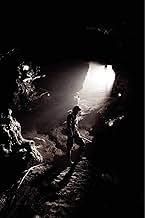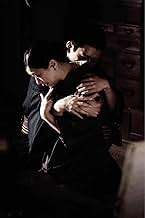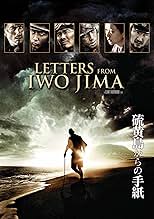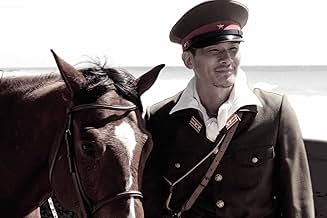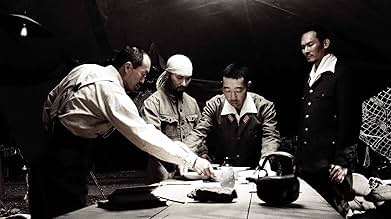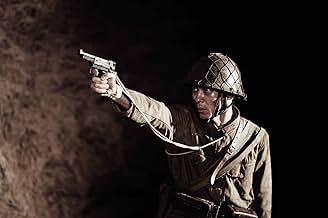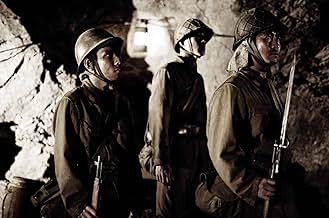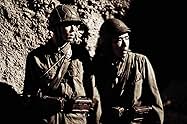La historia de la batalla de Iwo Jima entre los Estados Unidos y el Japón imperial durante la Segunda Guerra Mundial, contada desde la perspectiva de los japoneses que lucharon en ella.La historia de la batalla de Iwo Jima entre los Estados Unidos y el Japón imperial durante la Segunda Guerra Mundial, contada desde la perspectiva de los japoneses que lucharon en ella.La historia de la batalla de Iwo Jima entre los Estados Unidos y el Japón imperial durante la Segunda Guerra Mundial, contada desde la perspectiva de los japoneses que lucharon en ella.
- Ganó 1 premio Óscar
- 25 premios y 39 nominaciones en total
Shidô Nakamura
- Lieutenant Ito
- (as Shidou Nakamura)
Luke Eberl
- Sam
- (as Lucas Elliot)
Sonny Saito
- Medic Endo
- (as Sonny Seiichi Saito)
Argumento
¿Sabías que...?
- CuriosidadesMost of the young cast knew nothing about the incidents on Iwo Jima, as it is not taught in Japanese schools.
- PifiasDuring the rainstorm about 25 minutes into the movie, several soldiers disembark from a plane. The first soldier's clothing is nice and dry before he steps out into the rain but the second two already have wet jackets, suggesting this was not the first take of this scene.
- Citas
General Tadamichi Kuribayashi: If our children can live safely for one more day it would be worth the one more day that we defend this island.
- Banda sonoraString Quartet No.6, Op. 1-6, Hob. III-6, Mov.2
Composed by Joseph Haydn
At a party where Ken Watanabe participated
Reseña destacada
I was very disappointed to learn that this movie was only going to have a limited showing in the US, only one or two theaters on either coast. My wife and I both enjoyed "Flags" and were pleased when we learned that Clint Eastwood made a second movie, this time telling the story from the Japanese perspective. As luck would have it, we going to Japan for the holidays so we decided to try and see the movie in Tokyo during our trip. We went to the Ginza area of Tokyo and, to our surprise, the movie was completely sold out. We needed to buy tickets at least one day in advance. Further, we learned that the movie was currently number 1 in Japan. Wow that's impressive that an American made movie would become number one in Japan! Way to go, Clint! After a little extra planning and some adjustments to our schedule, we bought advance tickets and came back the next day.
We completely loved it. We were moved and stirred with many emotions including anger, anger over the horrors of war. We actually liked it better than "Flags of our Fathers". The movie was in Japanese and, as near as we could tell, Japanese appears to be the native language of the film. There were brief moments of English, American solders talking, one flash back scene before the war during a foreign dignitary dinner, and of course the credits at the end. The movie would have to be translated and/or sub titled to English in order to have half a chance in the US. Frankly, I think translation would take away from the movie's beauty and meaning. I understand a limited amount of Japanese so I could follow most of the story. The theater was very big and packed. I was a little uncomfortable at first; I may well have been the only American in the place. My wife (who is Japanese) and I sat next to an older couple. At several points during the film, I thought I noticed the man from the couple crying. When the film ended, my wife talked with the couple and learned that the old man's father died in Iwo jima. Later during the trip, speaking with Japanese friends and seeing the Japanese news, stories of lost loved ones from the war were common and this movie for the Japanese people has brought many of these memories out in the open.
To the Japanese, Iwo jima was a part of their homeland where a foreign invader was going to land and begin its invasion on Japanese soil. Throughout all of recorded Japanese history, never had a foreign invader prevailed in war against the Japanese on Japanese land. The imperial Japanese government of that time used this when they sent fighters to Iwo jima. These fighters were to ordered to "fight to the death" defending their country. That to loose and not die fighting would bring disgrace to self and family. They knew that America was planning to send an overwhelming force and they knew that they were being sent to die. For Americans, Iwo jima was just another far away place and different point in time where American boys were sent and where, unfortunately, some lives were lost fighting for freedom. My god, have we become that blasé about the wars our sons and daughters are being sent to fight in? My wife and I are unique, not typical American movie goers. I'm American, my wife is Japanese. Together, we've visited and cried together at the A-bomb Dome in Hiroshima, and again at the Arizona Memorial in Hawaii. I have relatives who fought in the Pacific, she also has family who fought in the war and who lived in Hroshima. I have two sons now serving in the US Marines. Together my wife and I watched and enjoyed both movies. The movies really didn't bring anything new, historically, to us about Iwo jima. But, the movies did do an excellent job reminding us that the ones who pay the price for war are normal everyday people. People who really don't understand the reasons or the politics behind why they are being sent to die. People who live, love, and are loved by family and friends. People with dreams and ambitions. But, for some reason when called by the leaders of the time, they go forward, obey orders, and do their duty. Sometimes, paying the ultimate price.
I've grown up with Clint Eastwood and it has been a wonderful entertaining journey. These two movies are, in my opinion, his best. Not because of the action, or the drama, or any of the other things that Clint Eastwood is known for, but because he's given us two interlinked stories about the affects of war on the people who are called to pay the ultimate price people like you and me. We may be from different cultures, eat different food, speak different languages, prey to God differently, but we all have things in common. We all live, love, want to be loved, and we dream about and long for peace. And, sometimes we are called to serve and pay for the opportunity. Thank you Clint.
We completely loved it. We were moved and stirred with many emotions including anger, anger over the horrors of war. We actually liked it better than "Flags of our Fathers". The movie was in Japanese and, as near as we could tell, Japanese appears to be the native language of the film. There were brief moments of English, American solders talking, one flash back scene before the war during a foreign dignitary dinner, and of course the credits at the end. The movie would have to be translated and/or sub titled to English in order to have half a chance in the US. Frankly, I think translation would take away from the movie's beauty and meaning. I understand a limited amount of Japanese so I could follow most of the story. The theater was very big and packed. I was a little uncomfortable at first; I may well have been the only American in the place. My wife (who is Japanese) and I sat next to an older couple. At several points during the film, I thought I noticed the man from the couple crying. When the film ended, my wife talked with the couple and learned that the old man's father died in Iwo jima. Later during the trip, speaking with Japanese friends and seeing the Japanese news, stories of lost loved ones from the war were common and this movie for the Japanese people has brought many of these memories out in the open.
To the Japanese, Iwo jima was a part of their homeland where a foreign invader was going to land and begin its invasion on Japanese soil. Throughout all of recorded Japanese history, never had a foreign invader prevailed in war against the Japanese on Japanese land. The imperial Japanese government of that time used this when they sent fighters to Iwo jima. These fighters were to ordered to "fight to the death" defending their country. That to loose and not die fighting would bring disgrace to self and family. They knew that America was planning to send an overwhelming force and they knew that they were being sent to die. For Americans, Iwo jima was just another far away place and different point in time where American boys were sent and where, unfortunately, some lives were lost fighting for freedom. My god, have we become that blasé about the wars our sons and daughters are being sent to fight in? My wife and I are unique, not typical American movie goers. I'm American, my wife is Japanese. Together, we've visited and cried together at the A-bomb Dome in Hiroshima, and again at the Arizona Memorial in Hawaii. I have relatives who fought in the Pacific, she also has family who fought in the war and who lived in Hroshima. I have two sons now serving in the US Marines. Together my wife and I watched and enjoyed both movies. The movies really didn't bring anything new, historically, to us about Iwo jima. But, the movies did do an excellent job reminding us that the ones who pay the price for war are normal everyday people. People who really don't understand the reasons or the politics behind why they are being sent to die. People who live, love, and are loved by family and friends. People with dreams and ambitions. But, for some reason when called by the leaders of the time, they go forward, obey orders, and do their duty. Sometimes, paying the ultimate price.
I've grown up with Clint Eastwood and it has been a wonderful entertaining journey. These two movies are, in my opinion, his best. Not because of the action, or the drama, or any of the other things that Clint Eastwood is known for, but because he's given us two interlinked stories about the affects of war on the people who are called to pay the ultimate price people like you and me. We may be from different cultures, eat different food, speak different languages, prey to God differently, but we all have things in common. We all live, love, want to be loved, and we dream about and long for peace. And, sometimes we are called to serve and pay for the opportunity. Thank you Clint.
- sford-20
- 5 ene 2007
- Enlace permanente
Selecciones populares
Inicia sesión para calificar y añadir a tu lista para recibir recomendaciones personalizadas
Detalles
- Fecha de lanzamiento
- País de origen
- Sitios oficiales
- Idiomas
- Títulos en diferentes países
- Cartes des d'Iwo Jima
- Localizaciones del rodaje
- Empresas productoras
- Ver más compañías en los créditos en IMDbPro
Taquilla
- Presupuesto
- 19.000.000 US$ (estimación)
- Recaudación en Estados Unidos y Canadá
- 13.756.082 US$
- Fin de semana de estreno en EE. UU. y Canadá
- 89.097 US$
- 24 dic 2006
- Recaudación en todo el mundo
- 68.673.228 US$
- Duración2 horas 21 minutos
- Color
- Mezcla de sonido
- Relación de aspecto
- 2.39 : 1
Contribuir a esta página
Sugerir un cambio o añadir el contenido que falta







